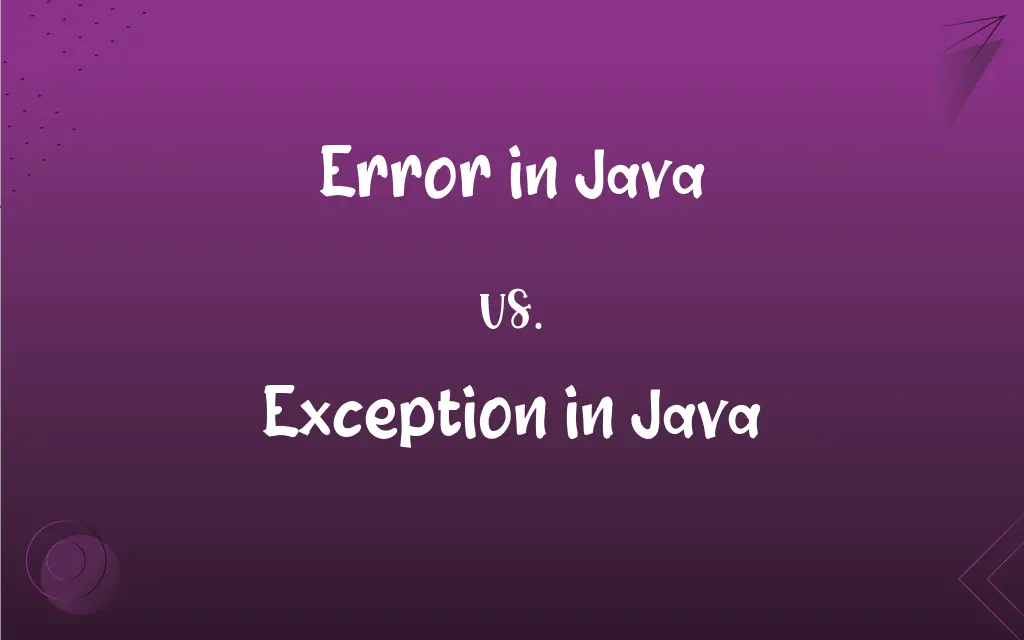Error in Java vs. Exception in Java: What's the Difference?
Edited by Aimie Carlson || By Janet White || Published on February 17, 2024
In Java, an error is a serious issue that arises from the environment in which the application runs, often beyond the programmer's control. An exception, however, is a condition that occurs during program execution and can be handled by the program.

Key Differences
An error in Java is indicative of a serious problem that a typical Java application should not try to catch, such as an issue with the system's hardware or the JVM itself. Exceptions in Java are conditions that occur because of issues in the program's logic or runtime environment, which can be caught and handled within the program.
Errors in Java, represented by the Error class in the java.lang package, are usually linked to the environment in which the application is running, like out-of-memory errors. Exceptions, represented by the Exception class, are more about issues within the control of the application, like trying to access an index out of bounds in an array.
In Java, errors are typically unchecked, meaning that they are not required to be declared in a method's or constructor's throws clause. Exceptions are divided into checked exceptions, which must be either caught or declared in the throws clause, and unchecked exceptions, which do not need to be explicitly handled.
Handling errors in Java is generally not recommended because they are often fatal and indicate that the JVM or the system is in an unstable state. Exceptions, however, are meant to be caught and handled, allowing the application to take corrective action or fail gracefully.
Examples of errors in Java include OutOfMemoryError and StackOverflowError, which typically signal unrecoverable conditions. Exceptions include IOException, SQLException, and NullPointerException, which are often recoverable through proper handling in the code.
ADVERTISEMENT
Comparison Chart
Nature
Indicates serious system problem
Indicates a condition that a program might want to catch
Handling
Not meant to be caught
Should be caught and handled
Type
Usually unchecked
Can be either checked or unchecked
Example
OutOfMemoryError
IOException
Origin
System or JVM issues
Program logic or runtime issues
ADVERTISEMENT
Error in Java and Exception in Java Definitions
Error in Java
Error typically signifies problems outside the application's control.
An OutOfMemoryError occurs when the JVM runs out of memory.
Exception in Java
Exception includes both checked and unchecked types.
FileNotFoundException is a checked exception that must be declared or caught.
Error in Java
Error is often fatal and can terminate the program.
LinkageError is encountered when there is a problem with class dependencies.
Exception in Java
Exception in Java is a subclass of Throwable, used for handling errors in a program.
The program used a try-catch block to handle IOException.
Error in Java
Error is generally not meant to be caught by applications.
Catching VirtualMachineError is risky as it indicates JVM breakdown.
Exception in Java
Exception is typically recoverable through proper handling.
A NullPointerException was caught and handled in the application.
Error in Java
Error in Java is a subclass of Throwable, indicating serious problems.
The program crashed due to a StackOverflowError.
Exception in Java
Exception often results from incorrect program logic or input.
An ArrayIndexOutOfBoundsException occurred due to an invalid array index.
Error in Java
Error usually indicates a failure in the JVM or hardware.
A NoClassDefFoundError can happen if a class file is corrupted.
Exception in Java
Exception can be explicitly thrown and caught.
The method threw a custom InvalidUserInputException.
FAQs
What is an error in Java?
An error is a serious issue typically related to the Java runtime environment or system.
What is an exception in Java?
An exception is a condition that arises during the execution of a program and can be handled.
Should I try to catch an error in Java?
Generally, no. Errors indicate severe problems that a normal application should not attempt to handle.
Can errors be prevented in Java?
Errors are often outside of the programmer's control and are hard to predict or prevent.
Are exceptions in Java recoverable?
Yes, exceptions are often recoverable through proper handling in the program.
What are checked exceptions in Java?
Checked exceptions are exceptions that must be either caught or declared in the method's throws clause.
How do I handle an exception in Java?
Use a try-catch block to catch and handle exceptions.
What's an example of an exception in Java?
SQLException is an example of an exception, indicating an issue with database access.
What's an example of an error in Java?
OutOfMemoryError is an example of an error, indicating the JVM has run out of memory.
How are errors and exceptions related in Java?
Both are subclasses of the Throwable class but represent different issues.
Can I create my own exceptions in Java?
Yes, you can create custom exceptions by extending the Exception class.
Is NullPointerException an error or an exception?
It's an unchecked exception.
What causes an ArrayIndexOutOfBoundsException?
Accessing an array with an illegal index causes this exception.
Is Error a runtime or compile-time issue?
Error is typically a runtime issue.
How does a StackOverflowError occur in Java?
It occurs when there is excessive use of the call stack, typically due to deep or infinite recursion.
What does it mean to throw an exception in Java?
Throwing an exception means explicitly generating an exception using the throw keyword.
Are all exceptions in Java checked?
No, there are both checked and unchecked exceptions.
Is an IOException an error or an exception in Java?
It's a checked exception related to Input/Output operations.
Can I ignore a checked exception in Java?
No, checked exceptions must be either caught or declared in the method's throws clause.
What is the purpose of the finally block in exception handling?
The finally block is used to execute code that must run regardless of whether an exception is caught.
About Author
Written by
Janet WhiteJanet White has been an esteemed writer and blogger for Difference Wiki. Holding a Master's degree in Science and Medical Journalism from the prestigious Boston University, she has consistently demonstrated her expertise and passion for her field. When she's not immersed in her work, Janet relishes her time exercising, delving into a good book, and cherishing moments with friends and family.
Edited by
Aimie CarlsonAimie Carlson, holding a master's degree in English literature, is a fervent English language enthusiast. She lends her writing talents to Difference Wiki, a prominent website that specializes in comparisons, offering readers insightful analyses that both captivate and inform.































































